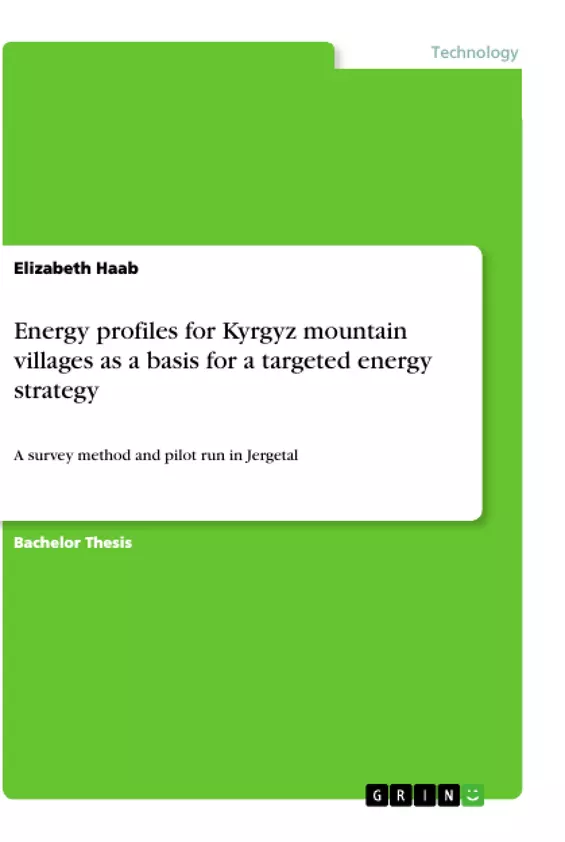Clean, reliable energy is an important factor for any village or areas development. Despite this, 1.2 billion people had no access to electricity and 2.8 billion people relied on traditional biomass for cooking and heating in 2016 according to the International Energy Agency. One of the United Nations Sustainable Development Goals states that by 2030 everyone should have access to clean, sustainable energy. In light of this, the aim of this project was to design a methodological approach to appraise the
energy situation in a Kyrgyz mountain village in order to make it possible for that village to work towards the energy targets of the Sustainable Development Goals in a clear, focused way. To do this, two surveys – a questionnaire and an observational survey - were developed that included all energy related topics such as reliability, affordability, availability, quality and
cleanness of energy as well as energy efficiency, and percentage of renewable energies. The advantage of these surveys as a profiling method is that it is able to be used across a wide range of landscapes, energy situations and demographics. With it a clear picture can be painted as to what the energy situation is and what steps would have to be taken to ameliorate
the situation.
The surveys were tested in a pilot run in a village called Jergetal, where the researchers spent ten days interviewing 16 households and taking notes and pictures on the state of the buildings and any energy efficiency measures or renewable energy technology. The survey results showed that while all the households had access to electricity, the heating
and cooking was mainly done with fire fueled by coal and dung bricks. The houses were not insulated and no renewable energies were being used. The main reasons for this was lack of information and lack of funds. According to the evaluated surveys, next steps would be to work on energy efficiency, doing courses in insulating houses with local materials and teaching villagers how to build energy efficient stoves. The survey itself will be handed over to the local partners for further developing and testing.
Inhaltsverzeichnis (Table of Contents)
- Introduction
- Energy goals
- Energy profiling
- Research question, aims and scopes of the thesis
- Partnering Organizations
- Overview
- Background
- Kyrgyzstan: general information
- Energy situation in Kyrgyzstan
- Energy distribution
- Energy usage
- Renewable Energies
- Energy efficiency
- Survey
- Survey development
- Survey location
- Survey execution
- Data evaluation
- Results
- Other results
- Energy efficiency courses through CAMP Alatoo
- Discussion
- Conclusion and Outlook
- Method
- Survey
- Outlook
- Method
Zielsetzung und Themenschwerpunkte (Objectives and Key Themes)
This bachelor thesis focuses on developing a methodological approach to assess the energy situation in Kyrgyz mountain villages, specifically aiming to facilitate their progress towards the energy targets set by the United Nations Sustainable Development Goals. The project involved creating and testing a survey method for energy profiling, with a pilot run in the village of Jergetal. The study highlights the importance of clean, reliable energy for rural development and emphasizes the need for tailored energy strategies in mountainous regions.
- Energy profiling for Kyrgyz mountain villages
- Sustainable energy development in rural areas
- Development of a survey methodology for energy assessment
- Energy efficiency and renewable energy utilization
- Addressing challenges related to energy access and affordability
Zusammenfassung der Kapitel (Chapter Summaries)
- Introduction: This chapter introduces the global context of energy access and the importance of sustainable energy development. It also presents the specific research question, aims, and scope of the thesis, outlining the project's partnership with local organizations.
- Background: This chapter provides general information about Kyrgyzstan and its energy situation. It outlines the distribution and usage of different energy sources, including renewable energies and energy efficiency measures.
- Survey: This chapter details the development, location, execution, and data evaluation of the survey method designed to assess energy profiles in Kyrgyz villages.
- Results: This chapter presents the key findings from the pilot run of the survey in Jergetal. It provides insights into the energy situation in the village, including reliance on traditional energy sources and limitations related to energy efficiency.
- Discussion: This chapter analyzes the survey results and discusses their implications for developing targeted energy strategies for Kyrgyz mountain villages. It highlights the need for energy efficiency improvements and the potential of renewable energy technologies.
Schlüsselwörter (Keywords)
This bachelor thesis focuses on energy profiling, energy strategy, sustainable development, and the development of survey methods for assessing energy needs in Kyrgyz mountain villages. It explores themes related to access to clean energy, energy efficiency, renewable energy technologies, and the socio-economic context of rural communities in mountainous regions. The pilot study in Jergetal provides a case study for applying the developed methodology.
Frequently Asked Questions
What is the goal of the UN Sustainable Development Goal regarding energy?
The goal is that by 2030, everyone should have access to clean, reliable, and sustainable energy.
What is "energy profiling"?
It is a methodological approach to appraise the specific energy situation (reliability, affordability, cleanness) in a village to plan focused improvements.
What were the findings in the village of Jergetal?
While households had electricity, heating and cooking relied on coal and dung. Houses lacked insulation, and no renewable energy technologies were in use.
Why is renewable energy not used in these mountain villages?
The main reasons identified were a lack of information and a lack of available funds for the initial investment.
What are the recommended next steps for Jergetal?
Key steps include energy efficiency courses for insulating houses with local materials and teaching the construction of energy-efficient stoves.
- Citation du texte
- Elizabeth Haab (Auteur), 2017, Energy profiles for Kyrgyz mountain villages as a basis for a targeted energy strategy, Munich, GRIN Verlag, https://www.grin.com/document/935832



